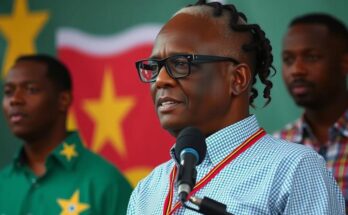Mozambique is preparing for presidential elections where the ruling Front for the Liberation of Mozambique (Frelimo) intends to maintain its power for another term. The elections pit Frelimo’s Daniel Chapo against independent challenger Venancio Mondlane, set against a backdrop of ongoing insurgency and economic issues. Electoral integrity remains a concern amid accusations of prior misconduct by Frelimo, with international observers monitoring the process closely.
Mozambique is set to hold presidential elections on Wednesday, which are anticipated to extend the ruling Front for the Liberation of Mozambique’s (Frelimo) nearly 50-year dominance since the country achieved independence from Portugal in 1975. Daniel Chapo, the party’s candidate and current governor of Inhambane—a region renowned for its tourism—is seeking to succeed Filipe Nyusi, who has served the maximum allowed two terms. In a significant challenge, independent candidate Venancio Mondlane, formerly associated with the opposition group Renamo, is poised to contest the elections vigorously. The elections will not only determine the presidency but also the composition of Parliament and provincial governors for Mozambique’s population of approximately 33 million. The ongoing jihadist insurgency in the Cabo Delgado province is a critical issue, with both leading candidates pledging to restore stability in a region where 1.3 million have been displaced. Following the closing of polls, vote-counting will commence, with preliminary results expected shortly thereafter. The full results must be reported to the Constitutional Council within 15 days for validation. It is noteworthy that Frelimo has faced accusations of electoral malpractice, having been accused of ballot-stuffing in past elections, including last year’s local elections, where it won 64 out of 65 municipalities—claims the party publicly denies. An array of international observers, including representatives from the European Union, will monitor the elections closely amid concerns regarding their integrity. Frelimo, having established a one-party state after independence, has had a tumultuous relationship with Renamo, including a lengthy civil war that only came to an end in 1992. Renamo will again contest these elections but has seen a decline in support. Mondlane’s campaign resonates particularly with the youth, who are grappling with high levels of poverty and unemployment, in a country known for its striking coastal beauty yet plagued by economic turmoil and natural disasters. Despite his appeal, most analysts predict that Frelimo is likely to maintain its grip on power, as demonstrated in prior elections where it commanded over 70% of the vote. Chapo’s ascension to the candidacy is perceived as a meticulously orchestrated move by Frelimo, making him a crucial figure in preserving the party’s longstanding rule hereafter. Should he triumph, Chapo would mark a historical milestone as the first leader born post-independence.
Mozambique has been navigating its political landscape since gaining independence from Portuguese colonial rule in 1975. The ruling party, Frelimo, has maintained power for nearly half a century, emerging from a civil war against the Mozambique National Resistance (Renamo) that concluded in 1992. The political history is marked by a blend of authoritarian governance and subsequent democratic elections. The 2024 elections occur against a backdrop of economic distress precipitated by widespread corruption and ongoing insecurity in northern regions due to jihadist violence, contributing to a complex electoral atmosphere. Voter disenfranchisement is evidenced by independent candidates facing obstacles in contesting effectively, raising implications about the integrity of electoral processes. The outcomes of these elections are poised to shape Mozambique’s future governance and socio-economic stability.
In summary, Mozambique’s upcoming presidential elections stand as a pivotal moment in the country’s history, potentially extending the ruling Frelimo party’s longstanding dominance. Despite opposition challenges, particularly from independent candidate Venancio Mondlane, the prevailing sentiment among analysts suggests that Frelimo is likely to secure victory again. The political climate is fraught with concerns over electoral integrity, compounded by the socio-economic issues plaguing the country. As the citizens prepare to cast their votes, the implications of this election stretch beyond mere political succession and deeply into the nation’s fight against instability and corruption.
Original Source: apnews.com



